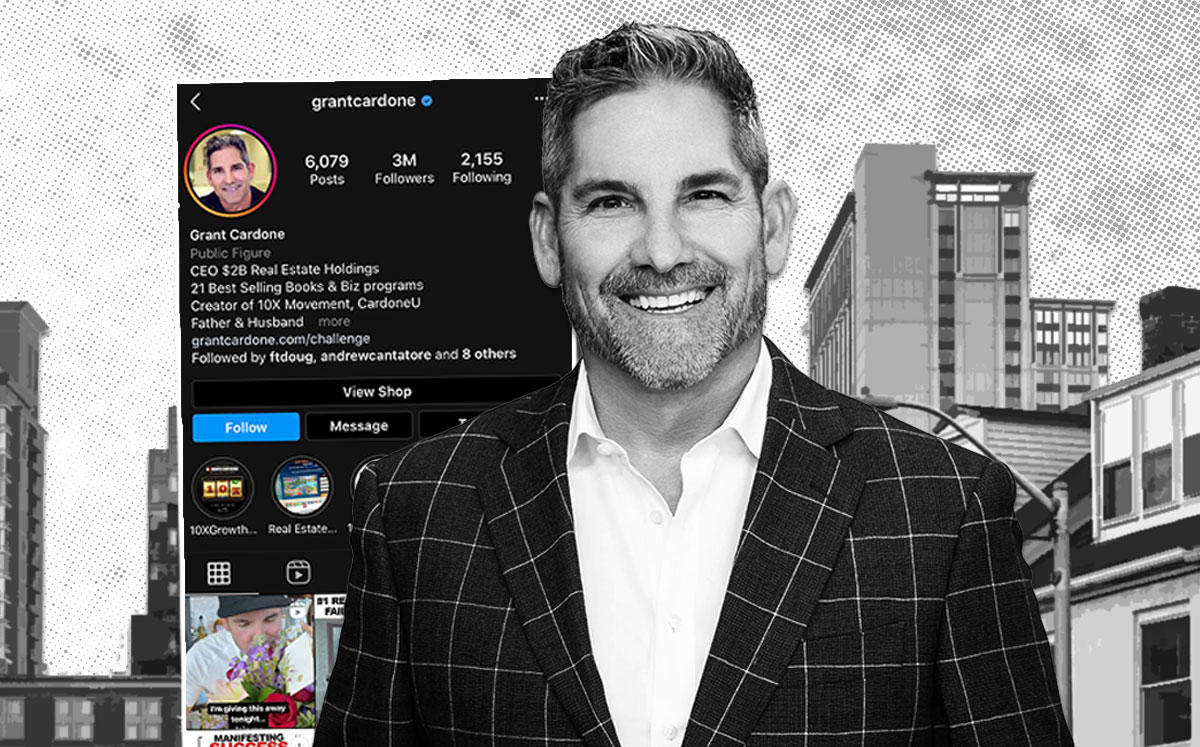Real estate crowdfunding guru Grant Cardone is facing allegations that he’s misled thousands of investors across the country by falsely promising them annual returns of at least 15 percent and other incentives that never materialized.
Fresh off their acquisition of a waterfront Fort Lauderdale apartment complex, Cardone and his Aventura, Florida-based firm Cardone Capital were accused of violating federal securities laws in a suit filed in federal court in Los Angeles earlier this month. The lawsuit alleges they made false and misleading statements and omitted material facts in connection with public offerings for two Cardone Capital funds totalling $100 million.
The funds raised money from investors through crowdfunding, including $50 million between 2018 and 2019 that was used to purchase an interest in a 346-unit apartment complex in Delray Beach, the lawsuit states. Between last year and June 25, Cardone Capital raised another $50 million, and some of the proceeds were used to purchase the Port Royale Apartments, a 22-acre waterfront complex with a private marina along the Intracoastal Waterway in Fort Lauderdale.
Luis Pino, an Inglewood, California resident who invested $10,000 into both funds in September of last year, is the lead plaintiff in the complaint, which seeks class action status. Pino’s attorney Marc Seltzer declined comment.
Cardone, whose Instagram account boasts more than 3 million followers, is a real estate entrepreneur who has leveraged his large social media presence into recruiting small-time investors hungry to put their money into commercial real estate deals, mostly involving multifamily properties. Cardone is also set to star in the upcoming season of Discovery’s reality television show, “Undercover Billionaire.”
During his keynote appearance at The Real Deal’s annual Miami Showcase & Forum last year, Cardone said celebrity appeal was a key ingredient to his success. At the time, he boasted his firm bought more than $400 million worth of real estate in Florida, mostly apartment buildings between Miami and Fort Lauderdale. “Money follows glitter and noise and lights,” Cardone said. “You build a brand and you get attention…How do you sell anything? You get attention.”
In an emailed statement, Cardone Capital said it attempted to return Pino his $10,000 investment upon learning of his lawsuit. “He declined so clearly the investor and his counsel have a different agenda,” the statement reads, adding that Cardone created Cardone Capital to “level the playing field.”
“We have raised over $425 million and have one investor who presented himself to be a non-accredited investor, who invested the minimum five thousand dollars into two different funds and is now attempting to assert a class action lawsuit against us,” according to the statement.
The lawsuit alleges that a Securities and Exchange Commission enforcement lawyer sent a letter to Cardone Capital on July 30, 2018, warning the firm to remove claims in one of its public offerings that investors would receive a monthly distribution that represented an approximately 15 percent annual return on investment. The SEC lawyer wrote that Cardone Capital did not appear to have a basis for promising such a return, the complaint alleges.
The lawsuit claims Cardone Capital ignored the warnings and continued to peddle misleading information to investors.
Cardone uses his Instagram account to post photos and videos of himself living a luxurious, wealthy lifestyle, as well as pitching his crowdfunding business. The content is accompanied by captions proclaiming others can be just as rich as him by investing with Cardone Capital. For instance, the lawsuit cites an Instagram video post on Sept. 17, 2019 in which Cardone claimed a $220,000 investment would result in a $660,000 position in one of the funds and would allow investors to earn about $12,000 to $15,000 a year in distributions.
“In fact, this statement was materially false and misleading because there was no reasonable basis for this representation and investors’ distributions have, in fact, been much lower than these amounts,” the lawsuit alleges.
Cardone also acquired some of the properties with his own money and then subsequently flipped the real estate to the Cardone Capital funds. In some cases, Cardone provided mortgages to the funds for the purchases, charging a 6 percent interest rate. Those were paid with investor monies, the lawsuit alleges.
